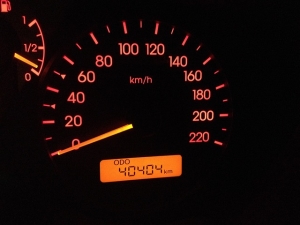Detecting Odometer Reading Fraud: A Guide for Car Buyers in Canada
Despite a used car’s appealing appearance, there may be hidden concerns, such as odometer fraud. The odometer reading or the number of miles the vehicle has traveled is crucial in assessing a vehicle’s value. Odometer rollbacks can skew this data. Here’s what you need to know to identify and prevent odometer fraud.
 Odometer rollbacks or odometer fraud, a deceptive tactic in the used car market, can have profound implications for both buyers and sellers. By artificially reducing the displayed mileage, unscrupulous individuals seek to inflate the perceived car’s value while obscuring the true vehicle history. This manipulation not only distorts the vehicle’s market worth but also undermines its reliability assessment, potentially concealing significant wear and tear that could affect future performance.
Odometer rollbacks or odometer fraud, a deceptive tactic in the used car market, can have profound implications for both buyers and sellers. By artificially reducing the displayed mileage, unscrupulous individuals seek to inflate the perceived car’s value while obscuring the true vehicle history. This manipulation not only distorts the vehicle’s market worth but also undermines its reliability assessment, potentially concealing significant wear and tear that could affect future performance.
With the advancement of technology, digital odometers have replaced mechanical odometers, presenting new challenges in detecting and preventing rollback fraud. Despite efforts to enhance security measures, perpetrators continue to devise sophisticated methods to bypass electronic safeguards, highlighting the persistent need for vigilance and regulatory measures to combat odometer fraud effectively.
Conduct a pre-purchase inspection: Arrange for a thorough examination of the vehicle by a qualified mechanic to identify any potential issues.
Obtain a vehicle history report: Obtain a comprehensive report detailing the car’s previous ownership, accident history, service records, and odometer readings.
Compare odometer readings: Cross-reference the odometer readings in the car report with the displayed mileage to ensure consistency and detect potential odometer rollbacks.
Assess wear and tear: Scrutinize the vehicle’s condition, including the wear on components like the steering wheel, gear lever, and pedals, to determine if it aligns with the odometer reading.
Consider regional mileage averages: Research typical mileage averages for vehicles in the local region to gauge the reasonability of the odometer reading and make an informed decision about the purchase.
Reliability and Accurate Mileage Records: Buyers rely on accurate mileage records to assess a vehicle’s reliability and overall condition. Odometer rollbacks can distort these records, leading to misinformed purchase decisions.
Impact on Longevity and Value: A car’s travel history directly impacts its longevity and resale value. Odometer fraud diminishes the perceived market value, as buyers may unknowingly pay more for a car with lower mileage than its actual recorded distance.
Financial Risks: Purchasing a car with a rolled-back odometer poses financial risks to buyers. They may end up overpaying for a vehicle that is worth significantly less than advertised, leading to financial losses in the long run.
Legal Implications: Odometer tampering constitutes fraud and is illegal in most jurisdictions. Buyers who unknowingly purchase a car with a manipulated odometer may face legal consequences, while sellers engaging in this practice may be subject to penalties and fines.
Trust and Reputation: Sellers who engage in odometer fraud compromise trust and integrity, tarnishing their reputation in the automotive market. Detecting and preventing odometer rollbacks is crucial for maintaining trust between buyers and sellers in the used car industry.
Consult a Dealership: Seek assistance from a dealership to access the vehicle’s control module data for accurate mileage verification.
Report to Authorities: Fraudulent odometer adjustments are a criminal offense; report suspicions immediately to law enforcement or regulatory agencies.
Stay Vigilant: Remain alert during the purchasing process, utilizing resources like vehicle history reports and expert advice to detect fraud.
Utilize Resources: Take advantage of online platforms and automotive professionals to verify odometer accuracy and protect yourself as a consumer.
Understanding Odometer Fraud
 Odometer rollbacks or odometer fraud, a deceptive tactic in the used car market, can have profound implications for both buyers and sellers. By artificially reducing the displayed mileage, unscrupulous individuals seek to inflate the perceived car’s value while obscuring the true vehicle history. This manipulation not only distorts the vehicle’s market worth but also undermines its reliability assessment, potentially concealing significant wear and tear that could affect future performance.
Odometer rollbacks or odometer fraud, a deceptive tactic in the used car market, can have profound implications for both buyers and sellers. By artificially reducing the displayed mileage, unscrupulous individuals seek to inflate the perceived car’s value while obscuring the true vehicle history. This manipulation not only distorts the vehicle’s market worth but also undermines its reliability assessment, potentially concealing significant wear and tear that could affect future performance.
With the advancement of technology, digital odometers have replaced mechanical odometers, presenting new challenges in detecting and preventing rollback fraud. Despite efforts to enhance security measures, perpetrators continue to devise sophisticated methods to bypass electronic safeguards, highlighting the persistent need for vigilance and regulatory measures to combat odometer fraud effectively.
